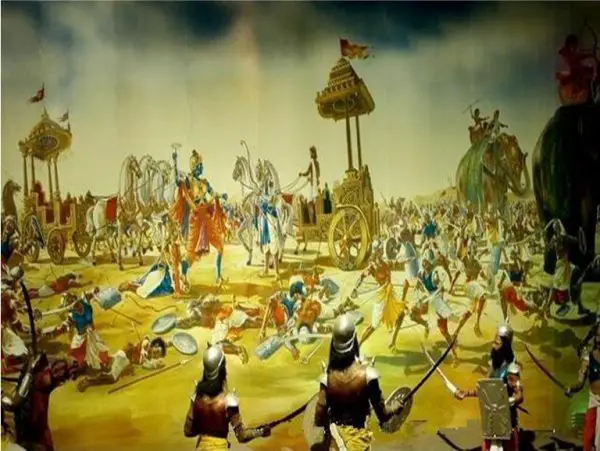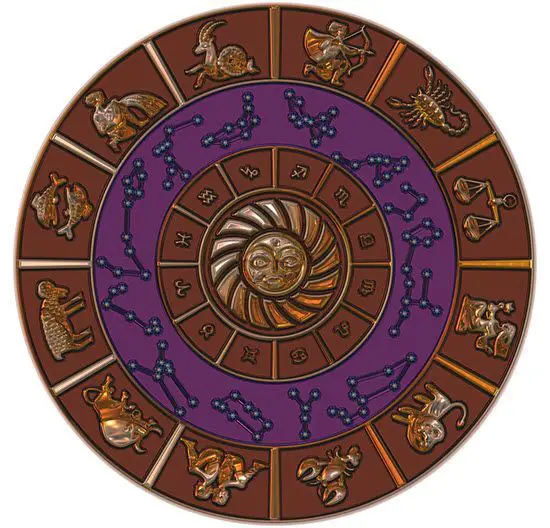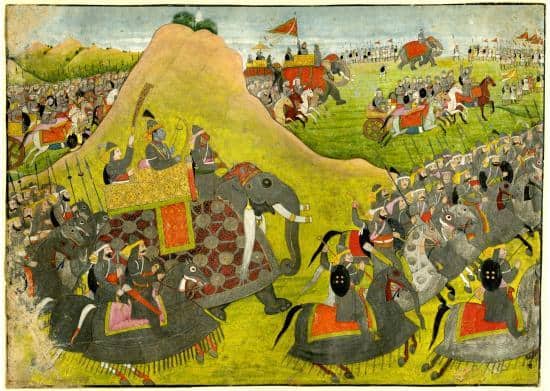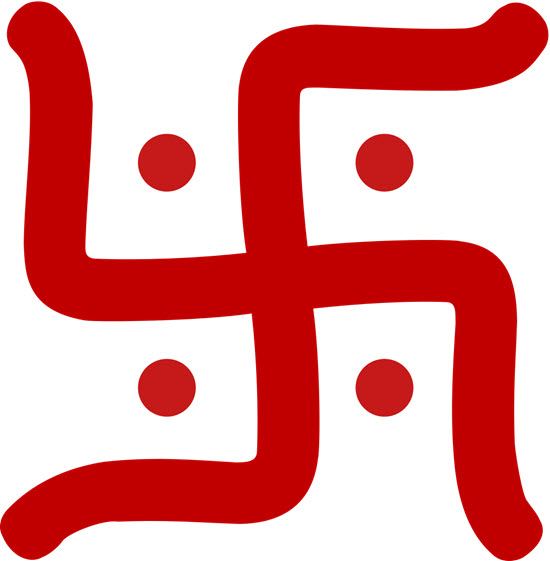Mahabharat (Sanskrit: Mahabharatam) is one of the most important Sanskrit epics of ancient India. The post shares with you Mahabharat Story and War.
This legendary epic narrates the struggle between the two groups of cousins, the Kaurava and the Pandava princes, who fought against each other in the Kurukshetra War for the throne of Hastinapur.
It also contains several smaller stories and even philosophical discourses in the form of Bhagavad Gita.
Traditionally, the authorship of Mahabharata is credited to Krishna-Dwaipayan Vyasa who dictated the verses to Lord Ganesh who wrote them down. He even appears as a major character in the epic.
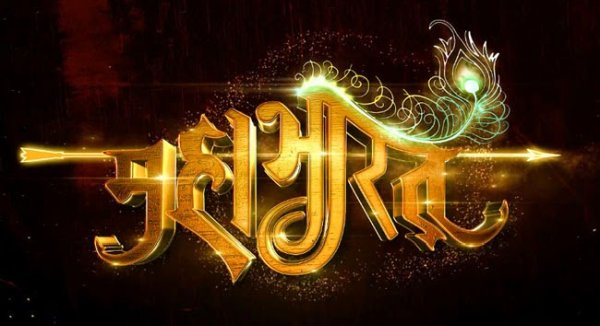
In fact, at 100,000 verses, Mahabharat stands out as the longest epic poem ever written. It’s about four times the length of the Ramayana. Moreover, Mahabharat is sometimes referred to as the Fifth Veda.
The origin of the epic is estimated to be around 8th and 9th centuries BCE. However, the oldest preserved parts of the Mahabharata text is dated around 400 BCE.
Table of Contents
Mahabharat History
The Mahabharat epic is traditionally ascribed to the sage Krishna-Dwaipayan Vyasa. In fact, it is said that he dictated the text to Lord Ganesha who wrote down the text.
The epic has been framed in the form of “story within a story” structure which is otherwise known as “frametales.” In fact, this structure has been used in many Indian religious and non-religious works.
Mahabharata was first recited by the sage Vaisampayana at Takshashila (modern-day Taxila, Pakistan) to the King Janamejaya who was the great-grandson of the Pandava prince Arjun.
Many years later, it was again recited by Ugraśrava Sauti (a professional storyteller) to the assembled rishis at Naimisharanya.
Research suggests that the origin of the Mahabharat epic occurs after the early Vedic period and before the rise of the first Indian empire in the third century B.C.
So, the text is likely to be composed in the 8th or 9th century B.C.
In fact, it is estimated that the “final form” of the text probably reached by the early Gupta period, that is about the 4th century CE.
The Mahabharata epic has been divided into 18 Parvas or books which are as follows:
- Adi Parva – The Book of the Beginning
- Sabha Parva – The Book of the Assembly Hall
- Vana Parva – The Book of the Forest
- Virata Parva – The Book of Virata
- Udyoga Parva – The Book of the Effort
- Bhishma Parva – The Book of Bhishma
- Drona Parva- The Book of Drona
- Karna Parva- The Book of Karna
- Shalya Parva – The Book of Shalya
- Sauptika Parva – The Book of the Sleeping Warriors
- Stri Parva – The Book of the Women
- Shanti Parva – The Book of Peace
- Anushasana Parva – The Book of the instructions
- Ashvamedhika Parva – The Book of the Horse Sacrifice
- Ashramavasika Parva – The Book of the Hermitage
- Mausala Parva – The Book of the Clubs
- Mahaprasthanika Parva – The Book of the Great Journey
- Svargarohana Parva – The Book of the Ascent to Heaven
There is also an addendum to the 18 books known as “Harivamsa Parva” covering those portions of Krishna’s life that have not been covered in the 18 Parvas of the Mahabharata.
Mahabharata Story or Mahabharat Katha
Here, we have provided a brief but insightful account of the Mahabharata Story.
Let’s begin the Mahabharata Story or Mahabharat Katha.
King Janamejaya’s ancestor Shantanu was the king of Hastinapur. He was married to Goddess Ganga. They had a son named Devavrata who later came to be known as Bhishma, a great warrior.
After many years, King Shantanu marries Satyavati who was the daughter of the chief of fisherman. Shantanu promised her father that Satyavati’s son would inherit the throne of Hastinapur.
To guarantee his father’s promise, Devavrata took a vow to renounce the throne and to remain celibate throughout his life. On account of this terrible vow, Devavrata came to be known as Bhishma.
Shantanu and Satyavati had two sons, Chitrāngada and Vichitravirya. Upon Shantanu’s death, Chitrāngada becomes the king of Hastinapur. However, he lives a very short and uneventful life and dies. So, Vichitravirya is crowned as the king of Hastinapur.
Meanwhile, Bhisma proceeds to arrange the marriage of Vichitravirya with Amba, Ambika, and Ambalika. He attends the swayamvara of these three princesses that is arranged by their father, the King of Kasi.
Ambika and Ambalika agree to marry Vichitravirya. However, Amba tells Bhishma that she wishes to marry the King of Shalva. However, Shalva refuses to marry her.
Amba then returns to marry Bhisma who refuses due to his vow of celibacy. Amba becomes much enraged with Bhisma and holds him responsible for her plight. Later, Amba is reborn to King Dhrupad as Shikhandi who plays a vital role in the fall of Bhishma in the Kurukshetra War.
After some time, Vichitravirya also dies without leaving any heirs. So, Satyavati summoned her first son Vyasa to impregnate the two queens.
In fact, Vyasa was born to Satyavati of a great sage called as Parasara before her marriage to Shantanu.
Ambika gives birth to a blind child who is named as Dhritarashtra. Ambalika gives birth to a pale and unhealthy child who is named as Pandu.
Vyasa, even father, ’s a third son, named as Vidura, by the maid. He is born healthy and is regarded as one of the wisest characters in the Mahabharata. Later on, Vidura serves the role of Prime Minister to King Pandu and King Dhritarashtra.
When the princes grew up, Pandu was crowned the King of Hastinapur because of Dhritarashtra’s blindness.
Pandu was married to Kunti and Madri.
Dhritarashtra married Gandhari, who blindfolds herself to feel the pain like Dhritarashtra.
However, Shakuni, the brother of Gandhari, is upset with the marriage and vows to take revenge on the Kuru family.
King Pandu is cursed by sage Kindama that he would die if he engages in a sexual act. Later on, Pandu retires to the forest along with his two wives. Dhritarashtra becomes the king of Hastinapur, despite his blindness.
Kunti uses her mantra power given by sage Durvasa for sons. She used her boon to ask Dharma (the God of Justice), Vayu (the God of Wind), and Indra (the God of Heavens) for sons. Kunti gives birth to three sons through these gods that were named as Yudhishtira, Bhima, and Arjun.
Kunti also tells her mantra to queen Madri who gave birth to twins named Nakula and Sahadeva through the Ashwins.
Later on, Pandu dies when he tries to indulge in sex with Madri who commits Sati out of remorse.
So, Kunti raises the five brothers that are referred to as Pandava brothers.
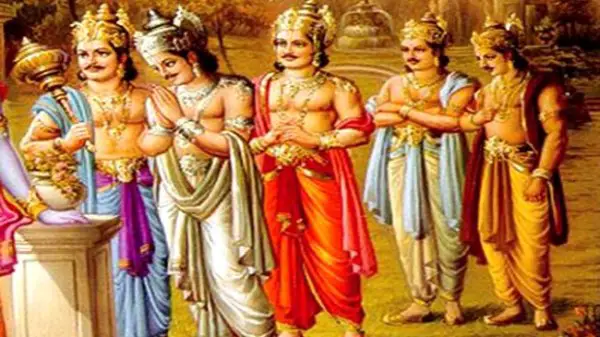
Dhritarashtra and Gandhari had a hundred sons and one daughter. They are referred to as Kaurava brothers. All were born after the birth of Yudhishtira. The eldest was named as Duryodhana. Other Kaurava brothers included Dushasana, Vikarna, Sukarna, and many others.
There were an immense rivalry and enmity between the Kaurava and Pandava brothers which eventually led to the Kurukshetra War.
Duryodhana, Shakuni, and Dushasana plot to kill the Pandavas. They called up the architect Purochana and told him to build a palace out of flammable materials such as lac and ghee. It was the house of lac known as Lakshagraha.
They arranged for the Pandavas along with Kunti to stay there. They wanted to set the palace alight. However, Pandavas were warned by Vidura, and they escaped through the tunnel, and they go into hiding. However, Kauravas presumed that they were dead.
Meanwhile, Bhima marries Hidimba (a rakshashi), and they have a son named Ghatotkachh.
While Pandavas were in hiding, there was a swayamvara for the hand of Panchala princess Draupadi. Pandavas disguised as Brahmins came to attend the swayamvara.
The task was to shoot the eye of a moving artificial fish which was hung on a ceiling while looking at its reflection in oil below.
All the princes fail, and many were unable to lift the bow itself. Finally, the swayamvara was opened to the Brahmins. Arjun won the contest and married Draupadi.
The Pandavas return home and tell their mother Kunti that Arjun has won a contest and requested her to look at what they had brought.
However, Kunti without looking at what they had brought tells them to share among themselves what Arjun has won. So, Draupadi ends up being the wife of all Pandava brothers.
Later on, the Pandava brothers were invited back to Hastinapur. They broke a deal with the Kuru family and obtained a portion of the kingdom in the form of a wild forest.
However, Pandavas transformed the region into a glorious territory and built the capital at Indraprastha.
Yudhishtira carries out the Rajasuya Yagna Ceremony and is successful in gaining a pre-eminent position among kings.
Arjun marries Krishna’s sister Subhadra.
Pandavas invite the Kauravas to Indraprastha.
Duryodhana felt jealous of the wealth of the Pandavas. He mistook a pond as a floor and fell into it. He was insulted by Draupadi. Duryodhana decides to take revenge and hosts a dice-game at Shakuni’s suggestion.
Shakuni played the dice game against Yudhistira. However, Yudhistira loses all his wealth and his kingdom. He eventually gambles his brothers, himself, and wife Draupadi into servitude.
Duryodhana and other Kauravas insult the Pandavas. Dushasana tries to disrobe Draupadi in front of the entire gathering. However, Krishna prevents it miraculously by making her dress endless.
Pandavas are ordered an exile for 12 years. In the 13th year, they have to remain hidden. However, if they are discovered in their 13th year of exile (by the Kauravas), they have to go into exile for another 12 years.
The Pandava brothers spend thirteen years in exile. Many adventures took place during this period. They spend the final year in disguise at the court of Virata.
When their exile is over, the Pandavas negotiate a return to Indraprastha with the Kauravas taking the help of Krishna as their emissary. However, Duryodhana declined their request and did not return their kingdom.
Finally, the Kauravas and the Pandavas gathered huge armies and fought against each other in the Great Mahabharata War known as the Kurukshetra War. Pandavas won the Mahabharata War at Kurukshetra.
The Mahabharata War
The Kauravas and the Pandavas summon vast armies and line up for the battle at Kurukshetra. It is popularly known as the Kurukshetra War.
The Pandavas allies included kingdoms of Panchala, Kasi, Magadha, Dwaraka, Kekaya, Pandyas, Chedi, Matsya, Telinga, Yadus of Mathura, and some other clans.
The Kauravas allies included kingdoms of Anga, Sindhudesa, Gandhara, Madra, Avanti, Kambojas, Mahishmati, and many others.
Balaram (the elder brother of Lord Krishna) was unhappy at the developing conflict and decided to go on pilgrimage. Krishna took a non-combatant role and offered to be a charioteer for Arjun.
Just when the battle was about to begin, Arjun gave up his arms and fell in despair. He tells Krishna that he can’t fight these people as they are his relatives, teachers, and brothers.
However, Krishna reminds him of his Kshatriya duties and motivates him to fight for the just cause. This philosophical discourse is summed up in the Bhagavad Gita.
Arjun gets convinced and picks up his bow again to fight the Kauravas.
The Great Mahabharata War raged for 18 days. It was a bloody battle at Kurukshetra in which 18 “akshauhinis” (army) participated, 7 on the Pandavas side and 11 on the Kauravas side.
Note: 1 akshauhini = 21,870 chariots + 21,870 elephants + 65,610 horses + 109,350 soldiers on foot
Casualties were high on both sides.
Eventually, Pandavas won the Mahabharata War.
All the sons of Dhritarashtra were killed in the battle at Kurukshetra including Duryodhana and Dushasana. Karna, the eldest son of Kunti who was born before her marriage to Pandu, was killed at the hands of Arjun.
Guru Dronacharya, the teacher of Kauravas and Pandavas, was dead. Bhishma lay dying on a bed of arrows. Abhimanyu, the son of Arjun and Subhadra, was killed at the hands of Kauravas.
At the end of this Mahabharata War, only the Pandavas, Kripa, Ashwatthama, Satyaki, Yuyutsu, Kritavarma, and Krishna survived.
After the Mahabharata War, Yudhishthira was crowned as the King of Hastinapur and Indraprastha. The Pandavas ruled the Hastinapur kingdom for thirty-six years after which they handed the reins to Abhimanyu’s son, Parikshit.
The Pandavas and Draupadi climbed the slopes of the Himalayas towards heaven. One by one, they fell on their last journey. Finally, their spirits ascended to the heavens.
Mahabharata Characters
Here, we have provided a brief account of the main characters in the great Indian epic Mahabharata.
Bhishma
Bhishma whose original name was Devavrata was the only surviving son of Shantanu and Ganga. He took a vow that he would lead a life of celibacy and will never claim the throne of Hastinapur. Bhishma served the kingdom of Hastinapur till his last breath. He was a great warrior and man of ethics, discipline, and fairness.
Lord Krishna
The lovable God is portrayed as a political reformer in the great epic Mahabharata. He gives the sermon of Bhagavad Gita to Arjun before the start of the Mahabharata War at Kurukshetra. Lord Krishna agrees to be the charioteer to Arjun in the battle at Kurukshetra. He upholds righteousness and balance in the entire Mahabharata story.

Yudhistira
He is the eldest of the Pandava brothers. He is also called as “Dharmaraj.” Yudhistira is regarded as the wisest of the Pandava brothers. He is an epitome of virtue.
Arjun
He is one of the Pandava brothers. Arjun is portrayed as the most skilled archer in the Mahabharata Story. He plays a decisive role in the Pandava victory at the battle of Kurukshetra against the Kauravas. He is a man of high morals, righteousness, and discipline. Besides Draupadi, Arjun married Subhadra and Ulipi.
Bheema
He is one of the Pandava brothers. In fact, Bheema was the strongest character in Mahabharata. Bheema possessed the strength of 10000 elephants. His half body was of Vajra. Bheema killed many Kaurava brothers in the Mahabharata War including Duryodhana and Dushasana. He also killed Bakasura, Jarasandh, Keechak, Kirmira, and Hidimb.
Nakula
Nakula was one of the Pandava brothers. He was the son of Madri who was Pandu’s second wife. Nakula was a great warrior like his brothers. He achieved many feats in the Mahabharata War. He defeated Dushasana on the first day of the battle.
Sahadeva
Sahadeva was the youngest Pandava. He was the son of Madri. He was a great warrior. Sahadeva slew Shakuni and also his son named Ulooka in the Mahabharata War. He was also an expert in astrology. Krishna sought his advice to know the opportune time to start the war.
Karna
Karna was the illegitimate son of Kunti that was born before her marriage to Pandu. He was brought up as a Suta Putra. He has the status of being one of the central characters in the Mahabharat Story. Karna was a great warrior. He was a kind-hearted person and was known as “Danveer” Karna. He took the side of the Kauravas in the Mahabharata War.
Dronacharya
Dronacharya was the royal guru (teacher) of the Kauravas and Pandavas. He was an excellent warrior and possessed superb combating skills.
Abhimanyu
Abhimanyu was the son of Arjun and Subhadra. He was skilled in warfare. However, he was trapped and died in the “Chakravyuh” fighting valiantly against the Kauravas at the Mahabharata War.
Duryodhana
He was the eldest son of Dhritarashtra and Gandhari. He led the Kauravas in the Mahabharata War. Duryodhana was a skillful warrior. He was a strong and powerful leader. He died at the hands of Bheema in the battle of Kurukshetra.
Shakuni
He was the brother of queen Gandhari. Shakuni was one of the most hated characters in Mahabharata. He was a shrewd politician and champion in the dice-game. He was killed at the hands of Sahadeva in the Mahabharata War.
Sanjay
Sanjay was blessed with “Divya Drishti” by Vyasa and narrated the Mahabharata War to Dhritarashtra. He was also the charioteer and advisor to Dhritarashtra.
Dushasana
He was the younger brother to Duryodhana. Dushasana dragged Draupadi with her hair to the Kuru court when ordered by Duryodhana at the dicing game. He tried to disrobe Draupadi. Bheema killed him in the Mahabharata War.
Dhritarashtra
He was the blind king of Hastinapur. He lacks the capabilities of a king and fails to maintain peace in his family and kingdom.
Gandhari
She was the wife of Dhritarashtra who blindfolded herself to feel the pain and helplessness of her husband. Gandhari was one of the strongest female characters in the Mahabharata Story. She was the one who cursed Lord Krishna as he failed to avoid the war between the Kauravas and the Pandavas.
Kunti
She was the first wife of King Pandu and mother of Yudhistira, Bheema, and Arjun. She also gave birth to an illegitimate son, Karna, before her marriage to Pandu. She was a great mother who accompanies the Pandava brothers when they are sent to exile.
Some untold stories from Mahabharata
Here, we share with you some of the untold and unknown tales from the great scripture of Mahabharata.
The story of the Five Golden Arrows
As the Mahabharata War progressed, the Kauravas were on the losing side. They suffered huge losses. So, Duryodhana became worried and approached Bhisma one night.
Duryodhana accused Bhishma that he was not fighting the war with all his strength and was favoring the Pandavas.
Bhisma was greatly disturbed at this accusation by Duryodhana and immediately picked up five golden arrows.
He chanted some mantras and declared that tomorrow he would kill all the Pandava brothers with these five golden arrows.
However, Duryodhana wanted custody of those five golden arrows and told Bhishma that he would return them the next morning.
Once Arjun had saved Duryodhana from the clutches of Gandharvas. Duryodhana had told Arjun to ask for a boon. However, Arjun said that he would ask for the honor when he needed it.
It was Lord Krishna who reminded Arjun of his unsatisfied boon. Krishna instructed Arjun to approach Duryodhana. He told Arjun to ask for the five golden arrows.
So, Arjun asked for the arrows, and as Duryodhana was bounded by his promise, he had to keep his words. Duryodhana then gave all the 5 golden arrows to Arjun.
Lord Balaram was the father-in-law of Abhimanyu
Abhimanyu was married to Vatsala who was the daughter of Lord Balaram. However, Balaram wanted that Vatsala should marry Duryodhana’s son Laxman.
Abhimanyu and Vatsala were in love with each other and wanted to marry each other.
Abhimanyu asked his brother Ghatotkachh to help him. Ghatotkachh tricked and terrified Laxman so much that he took a vow that he will not marry throughout his life.
Yuyutsu was the dasi Putra of Dhritarashtra
Yuyutsu was the dasi Putra of Dhritarashtra and was born to Sauvali (maidservant) who attended him when Gandhari was declared pregnant. Dhritarashtra was taken over by the charm of Sauvali and used her for his sexual gratification. Thus, Yuyutsu was born to Sauvali as dasi Putra of Dhritarashtra.
King of Udupi fed the Kurukshetra Warriors
While hundreds of kings aligned themselves on one side or the other, the King of Udupi chose to remain neutral and offered to be the caterer for this battle. In fact, many Udupi people are caterers even today. The amazing thing was that no food was wasted on all the 18 days of the battle.
King of Udupi used to visit Krishna’s tent every night. He served him boiled groundnuts in the night. If Krishna ate ten peanuts, the king would make out that tomorrow 10000 people will be dead. So, for the next day, he would cook food for 10000 people less.
Karna’s Last Test
Karna was lying on the battlefield and was in his last moments. Krishna wanted to test his generosity. So, he took the form of a poor Brahmin and approached Karna. Krishna (as a poor Brahmin) said to Karna, “I have heard your reputation as a charitable person and ask you for a gift.” Karna replied, “I shall give you whatever you want.”
So, Krishna asked for a small quantity of gold.
Karna picked up a stone and knocked out his teeth. He offered it to the “Brahmin.”
However, Krishna wanted to test Karna further.
So, Krishna in his guise as Brahmin said, “I cannot accept this as the teeth is dripping with blood.”
Karna pleaded, “Swami, please wait,” and immediately took out his arrow and aimed it at the sky. Rain began to drop from the clouds. So, the teeth got cleaned with the rain water. Karna offered his golden teeth with both his hands to the Brahmin.
Now, Krishna revealed his true identity to Karna. He highly appreciated the spirit of sacrifice shown by Karna. He said, “Ask me what you want.”
However, Karna offered his salutations to Lord Krishna and said that he feels blessed having the vision of the Lord which is enough for him.
Well, that’s all we have for you in this post.
We hope that you now are fully aware of the Mahabharat Story and War. It offers you a short but insightful account of the Mahabharat Story and War.
We hope that you liked the presentation. Thanks for Reading. Please share the post across popular social networks. We welcome your comments.

